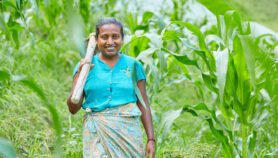By: Sharon Davis
Send to a friend
The details you provide on this page will not be used to send unsolicited email, and will not be sold to a 3rd party. See privacy policy.
A report warns that unsustainable demand for wild meat in central Africa — estimated at one million tonnes a year — poses a threat to food security in the region.
But the authors stress that banning bushmeat hunting and trade is not the solution.
The report, released yesterday (16 September) by the Centre for International Forestry Research (CIFOR), calls for region-specific policies to monitor and protect endangered species while allowing for sustainable hunting.
According to the report, bushmeat provides up to 80 per cent of the protein and fat needed in rural diets in Central Africa. The bushmeat trade has become a significant part of the informal economy, especially in the Democratic Republic of Congo.
But if current levels of hunting continue, supplies will fall dramatically — causing protein shortages and the extinction of many forest mammals within 50 years, says the report.
The authors say a well-regulated legal bushmeat industry will ensure poor people in rural regions can obtain both protein and income in an ongoing way.
But many government policies would have to be altered before a regulated industry could be created.
"More than 90 per cent of current hunting activities are illegal," says Nathalie van Vliet, a CIFOR associate and coordinator for the Landscape Mosaics Conservation Project in southern Cameroon. She told SciDev.Net that international conservation organisations tend to label those who eat bushmeat as criminals.
Bushmeat needs to be approached as a sustainable livelihood issue — and part of the global food crisis — rather than as an animal welfare problem, van Vliet says.
She says rights-based approaches to conservation efforts in Cameroon have succeeded in abolishing the hunting of the endemic and endangered Cross River Gorilla in the proposed Takamanda National Park.
Local people are allowed to hunt medium- and small-sized species such as duikers (small antelope) and porcupine. No gorillas have been killed since the change in approach.
"Suggestion of a total hunting ban shows a failure to understand the economic, public health and cultural significance of the bushmeat trade," says Justin Brashares, a wildlife ecology policy expert at the University of California in the United States.
"Effective resource management is closely tied to ownership of wildlife and a belief that belt-tightening today will yield returns tomorrow. Few rural communities in Africa have the rights or security that would allow such a world view," says Brashares. He stressed the need for economic and dietary alternatives as well as overhauling resource ownership statutes.
Link to full report [2.2MB]













